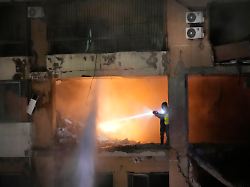After killing Hamas leader
France calls on Israel to show restraint in Lebanon
January 3, 2024, 11:53 a.m
Listen to article
This audio version was artificially generated. More info | Send feedback
Israel is said to have killed a senior leader of the Islamist Hamas in Beirut. Now Lebanon fears that it will be drawn into the Gaza war due to a backlash from Hezbollah. Meanwhile, French President Macron is demanding that Israel avoid “escalating behavior in Lebanon.”
After the killing of the number two of the Islamist Palestinian organization Hamas in Lebanon, French President Emmanuel Macron called on Israel to show moderation. As the Elysée Palace announced late Tuesday evening, Macron said in a phone call with Israeli minister and war cabinet member Benny Gantz that it was “essential to avoid any escalatory behavior, particularly in Lebanon.” France will continue to convey this message “to all actors directly or indirectly involved in the area,” it said.
A few hours earlier, the number two of the Islamist Palestinian organization Hamas, Saleh al-Aruri, was killed in a drone attack attributed to Israel on the Hamas office on the southern outskirts of the Lebanese capital Beirut. He is the deputy head of Hamas’ political bureau, making him the highest-ranking leader of the terrorist organization to have been deliberately killed during the Gaza war.
According to Hezbollah-allied Hamas, a total of seven people died in the attack, including two leaders of Hamas’ armed wing. The terrorist organization immediately blamed Israel. While Israel’s military declined to comment on reports of a targeted killing of Saleh al-Aruri, Lebanon’s Hezbollah militia announced retaliation on Tuesday evening: “This crime will never pass without response or punishment.”
According to their own statements, the militia carried out their first attack on a group of Israeli soldiers near the border that evening. There were deaths and injuries. According to Israeli media reports, the army is now expecting rocket fire from longer ranges.
Hezbollah’s tunnel system comes into focus
The attack on Saleh al-Aruri was the first on the Lebanese capital since the start of the war. So far, clashes between the Israeli army and the Lebanese Hezbollah militia – an ally of the Palestinian Hamas – have been limited to the border areas in southern Lebanon. Regular shelling between Hezbollah and Israel’s army near the border has increased since the Gaza war began three months ago. Hezbollah is considered to be far more powerful than Hamas.
Like Hamas, it is also said to have a tunnel system that, according to a media report, is far more sophisticated than Hamas’s. The underground tunnels ran for hundreds of kilometers in southern Lebanon all the way to the border with Israel, the Times of Israel quoted intelligence expert Tal Beeri as saying on Tuesday.
Government in Lebanon wants to prevent Hezbollah from reacting
According to a media report, the government in Lebanon is in contact with Hezbollah to prevent them from a possible backlash. Acting Foreign Minister Abdallah Bou Habib told British radio station BBC 4 on Tuesday evening that his government was speaking to Hezbollah to “convince them that they should not react themselves.”
The next 24 hours will show whether Hezbollah will respond or not, said Bou Habib. “We are very concerned, the Lebanese do not want to be drawn into this, even Hezbollah does not want to be drawn into a regional war.” He called on Western states to “put pressure on Israel to stop all its violence and all its actions, not only in Lebanon, not only in Beirut, but also in Gaza.” The government in Lebanon has only limited ability to act. The country is currently led by Prime Minister Najib Mikati. For over a year, the election of a president has repeatedly failed due to power struggles within the political elite.
Macron wants a “permanent ceasefire”
According to the Elysée Palace, French head of state Macron also reiterated in his conversation with Israeli Minister Gantz the demand to work towards a “permanent ceasefire” between Israel and Hamas with the help of “all regional and international partners”.
In addition, Macron once again expressed his “deepest concern about the very high number of civilians killed” and the “absolute humanitarian emergency” in the Gaza Strip, the presidential palace said. At the same time, the president reaffirmed France’s “commitment to Israel’s security.”
